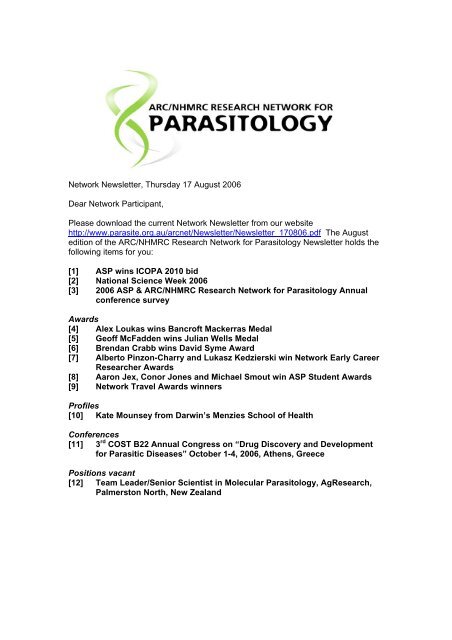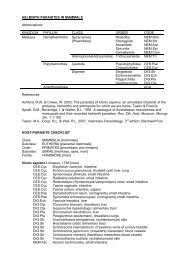17 Aug 2006 - Australian Society for Parasitology
17 Aug 2006 - Australian Society for Parasitology
17 Aug 2006 - Australian Society for Parasitology
- No tags were found...
Create successful ePaper yourself
Turn your PDF publications into a flip-book with our unique Google optimized e-Paper software.
Network Newsletter, Thursday <strong>17</strong> <strong>Aug</strong>ust <strong>2006</strong>Dear Network Participant,Please download the current Network Newsletter from our websitehttp://www.parasite.org.au/arcnet/Newsletter/Newsletter_<strong>17</strong>0806.pdf The <strong>Aug</strong>ustedition of the ARC/NHMRC Research Network <strong>for</strong> <strong>Parasitology</strong> Newsletter holds thefollowing items <strong>for</strong> you:[1] ASP wins ICOPA 2010 bid[2] National Science Week <strong>2006</strong>[3] <strong>2006</strong> ASP & ARC/NHMRC Research Network <strong>for</strong> <strong>Parasitology</strong> Annualconference surveyAwards[4] Alex Loukas wins Bancroft Mackerras Medal[5] Geoff McFadden wins Julian Wells Medal[6] Brendan Crabb wins David Syme Award[7] Alberto Pinzon-Charry and Lukasz Kedzierski win Network Early CareerResearcher Awards[8] Aaron Jex, Conor Jones and Michael Smout win ASP Student Awards[9] Network Travel Awards winnersProfiles[10] Kate Mounsey from Darwin’s Menzies School of HealthConferences[11] 3 rd COST B22 Annual Congress on “Drug Discovery and Development<strong>for</strong> Parasitic Diseases” October 1-4, <strong>2006</strong>, Athens, GreecePositions vacant[12] Team Leader/Senior Scientist in Molecular <strong>Parasitology</strong>, AgResearch,Palmerston North, New Zealand
4Congratulations to Aaron Jex from The University of Queensland whowon the ASP Student oral prize, Conor Jones from The University ofQueensland who won the ASP Student poster+oral prize, and MichaelSmout from the Queensland Institute of Medical Research who won theASP Student poster prize at the <strong>2006</strong> ASP & Network Conference.[9] Network Travel Award WinnersCongratulations to the most recent Network Researcher Exchange,Training and Travel Award winners:• Ms Linda M McInnes, a PhD student from Murdoch University whoattended the European Medical Biology Organisation course onAdvanced Techniques in Molecular Medicine course in Uppsala,Sweden in June and an <strong>Australian</strong> National University Nationalworkshop on Genetic Analysis <strong>for</strong> Population Studies in Canberra inJuly <strong>2006</strong>.• Dr. Abbey Bestall, a PhD Student from Murdoch University who willtravel to Melbourne to the Walter and Elisa Hall Institute <strong>for</strong> aResearcher Exchange. Abbey will work with Dr. Emanuela Handman’sLeishmania Laboratory to learn the ELISA technique to detect thepresence or absence of anti-Leishmania antibodies in kangaroo serum.• Neil Young, a PhD candidate from the University of Tasmania/AquafinCRC Health Program <strong>for</strong> his Researcher Exchange to work withProfessor Ben Koop’s laboratory at the Centre <strong>for</strong> BiomedicalResearch, University of Victoria, Canada between <strong>Aug</strong>ust and October<strong>2006</strong>. Neil is investigating amoebic gill disease (AGD), caused by aprotozoan parasite Neoparamoeba spp., of Atlantic salmon cultured insea-cages in Tasmania.• Matthew Dixon a PhD student from Queensland Institute of MedicalResearch <strong>for</strong> his Researcher Exchange to the laboratory of Dr JoanneThompson at the Institute of Immunology and Infection Research, atthe University of Edinburgh in <strong>Aug</strong>ust and September <strong>2006</strong>. Throughhis Exchange Matthew will obtain knowledge in per<strong>for</strong>mingtransfections in the rodent malaria’s P.berghei and P.chabaudi andapply this to the study of commitment to gametocytogenesis inPlasmodium.ARC/NHMRC Research Network <strong>for</strong> <strong>Parasitology</strong>, Institute <strong>for</strong> the Biotechnology of Infectious Diseases, University ofTechnology, Sydney, PO Box 123, Broadway, NSW, 2007, Australia. Telephone: +61-2-9514 4006; FAX: +61-2-9514 4201; E-mail: Lisa.Jones@uts.edu.au Website: http://www.parasite.org.au/arcnetSupported by the <strong>Australian</strong> Research Council, the National Health and Medical Research Council and the <strong>Australian</strong> <strong>Society</strong><strong>for</strong> <strong>Parasitology</strong>.
5Profiles[10] Network Travel Award <strong>for</strong> Molecular Parasitologist, Kate MounseyKate Mounsey is a PhD student at Darwin’s Menzies School of Healthworking as part of Dr Shelley Walton’s group. Kate won a NetworkTravel Award and in 2005 spent three months with Prof. RogerPrichard’s laboratory in McGill University, Canada to help her research.Kate spoke with Lisa Jones:Tell me about your area of research?My research looks at the molecular mechanisms of drug resistance inscabies. The first case of ivermectin resistance in the scabies mite wasdocumented in crusted scabies patients in North Australia. As part of my PhDI’m using molecular techniques to identify and characterise scabies mitegenes that are involved in ivermectin resistance.What interests you about working in this area?This work is challenging on many levels. Scabies mites are a difficult parasiteto study; there is no animal model or in vitro culture system so I rely onscabies patients admitted to hospital to collect and study the mites. Thesechallenges make it even more rewarding and exciting when I do make abreakthrough in my research. Scabies is a very important health problem,particularly amongst indigenous communities in remote central and northernAustralia. The disease is particularly prevalent in children and, not onlycauses discom<strong>for</strong>t, but secondary skin infections, which can lead to seriouscomplications such as rheumatic heart and kidney disease. My involvementwith scabies patients is a constant reminder of why my work is important.How has the Network travel award helped your research develop andhow do you see your research developing in the future?In Canada I worked with parasitologists at McGill University in Prof. RogerPrichard’s laboratory where I received training in techniques to investigategenes potentially involved with ivermectin resistance in scabies; this includedusing real-time PCR to study – <strong>for</strong> the first time - the expression of scabiesmite ABC transporters. Additionally, plans were made <strong>for</strong> continuedARC/NHMRC Research Network <strong>for</strong> <strong>Parasitology</strong>, Institute <strong>for</strong> the Biotechnology of Infectious Diseases, University ofTechnology, Sydney, PO Box 123, Broadway, NSW, 2007, Australia. Telephone: +61-2-9514 4006; FAX: +61-2-9514 4201; E-mail: Lisa.Jones@uts.edu.au Website: http://www.parasite.org.au/arcnetSupported by the <strong>Australian</strong> Research Council, the National Health and Medical Research Council and the <strong>Australian</strong> <strong>Society</strong><strong>for</strong> <strong>Parasitology</strong>.
6collaboration to further characterise a putative scabies mite chloride channelthat may act as a drug receptor <strong>for</strong> ivermectin. This was a huge boost to myresearch work both practically - as I was able to work with the world-leaders ofresearch into ivermectin resistance - and mentally, as a result of theconfidence, motivation and enthusiasm I gained from working at McGill. I findthis work very interesting and believe that the collaborative work with McGillUniversity is a direct result of the Network Travel Award.What advice do you have <strong>for</strong> other Network scientists who want to apply<strong>for</strong> a travel award?“Go <strong>for</strong> it - there’s nothing to lose”; the application process is very userfriendly!What advice do you have <strong>for</strong> science students who are consideringparasitology as a career?One of the good things about parasitology is the diversity involved – it’s agreat starting point to learn about different areas, <strong>for</strong> example host-parasiteinteractions, immunology, molecular biology or epidemiology. <strong>Parasitology</strong>may not appear as glamorous as other scientific fields, but it is so diverse thatyou can gain many skills and develop a holistic approach to your research. Myown research involvement goes beyond molecular parasitology – I alsoengage in public health work and patient interaction.What do you see as the benefits of being part of the Network?The main benefit of being part of the ARC/NHMRC Research Network <strong>for</strong><strong>Parasitology</strong> is that the Network supports <strong>Australian</strong> research and encouragescollaboration between groups, which improves the collective expertise.Tell me about the highlight of your science career so far?My trip to Canada and work at McGill was a fantastic opportunity and thehighlight of my science career so far.What would you like to do in the future?My PhD is due to finish this year. I hope to continue to work to improve thehealth and well-being of people who live in developing regions; and I want tocontinue my research work in molecular parasitology.We wish Kate all the best in her future and look <strong>for</strong>ward to hearing more abouther exciting research in molecular parasitology.Conferences[11] There is still time to register <strong>for</strong> the 3 rd COST B22 AnnualCongress on “Drug Discovery and Development <strong>for</strong> ParasiticDiseases”, October 1-4, <strong>2006</strong>, Athens, GreeceCongress in<strong>for</strong>mation can be found at the following website:http://www.eie.gr/iopc-costb22/index.htmlARC/NHMRC Research Network <strong>for</strong> <strong>Parasitology</strong>, Institute <strong>for</strong> the Biotechnology of Infectious Diseases, University ofTechnology, Sydney, PO Box 123, Broadway, NSW, 2007, Australia. Telephone: +61-2-9514 4006; FAX: +61-2-9514 4201; E-mail: Lisa.Jones@uts.edu.au Website: http://www.parasite.org.au/arcnetSupported by the <strong>Australian</strong> Research Council, the National Health and Medical Research Council and the <strong>Australian</strong> <strong>Society</strong><strong>for</strong> <strong>Parasitology</strong>.
7The topics to be covered include:• Novel targets <strong>for</strong> antiparasitic drug development• Rational design and synthesis of new antiparasitic drug candidates• Nature as a source <strong>for</strong> novel antiparasitic lead compounds• Screening methods <strong>for</strong> antiparasitic activity• Bridging genomics and proteomics towards new antiparasitic drugs• Molecular mechanisms of resistance in parasites• Targeted drug delivery against intracellular parasites• Hit-to-Lead and Lead optimisation and candidate selection• Networking <strong>for</strong> the development of antiparasitic drugsConfirmed SpeakersMarc Ouellette (Centre de Recherche en Infectiologie, Canada)Ian Hastings (Liverpool School of Tropical Medicine, UK)Mary Moran (The George Institute <strong>for</strong> International Health, Australia)Ernesto Fattorusso (U of Naples “Federico II”, Italy)Michael H. Gelb (U of Washington, USA)Henri Vial (U de Montpellier II, France)Guiseppe Campiani (U di Siena, Italy)Rolf Walter (Bernhard-Nocht-Institut für Tropenmedizin, Germany)Olle Heby (Umea Universiteit, Sweden)Angus Bell (Trinity College, Ireland)Stanny Geerts (Institute of Tropical Medicine, Belgium)Ian Gilbert (U of Dundee, UK)Barbara Papadopoulou (Centre de Recherche en Infectiologie, Canada)Hagai Ginsburg (The Hebrew University of Jerusalem, Israel)Position vacant[12] Team Leader/Senior Scientist in Molecular <strong>Parasitology</strong>,AgResearch, Palmerston North, New ZealandAre you ready to provide leadership and science excellence in this area ofanimal health research? Do you have a proven track record of developingnew biotechnologies?AgResearch, New Zealand’s largest Crown Research Institute, is seeking anexperienced molecular biologist with established skills and interest inparasitology to head up a team at the new Hopkirk Research Institute, inPalmerston North. The Hopkirk is a collaboration between Massey Universityand AgResearch.We want to hear from you if you are ready to step up and make a differenceby managing our Molecular <strong>Parasitology</strong> team. The team’s major focus is onmolecular biology of parasites affecting pastoral livestock species. It hasestablished itself as an international leader in transgenesis of parasiticnematodes and has well developed research interests in drug targetdiscovery, identification of genes important to parasitic life cycles, expressionARC/NHMRC Research Network <strong>for</strong> <strong>Parasitology</strong>, Institute <strong>for</strong> the Biotechnology of Infectious Diseases, University ofTechnology, Sydney, PO Box 123, Broadway, NSW, 2007, Australia. Telephone: +61-2-9514 4006; FAX: +61-2-9514 4201; E-mail: Lisa.Jones@uts.edu.au Website: http://www.parasite.org.au/arcnetSupported by the <strong>Australian</strong> Research Council, the National Health and Medical Research Council and the <strong>Australian</strong> <strong>Society</strong><strong>for</strong> <strong>Parasitology</strong>.
8and mapping of parasite genes and the genetic basis of anthelminticresistance in parasitic nematodes. The team interacts with, and providesmolecular support <strong>for</strong>, other research groups that focus on development ofvaccines to control parasite infections and development of diagnostic andother tools that have utility in managing parasitic diseases in the livestockindustry.In addition to having strong scientific skills, this position requires you tobe:• Decisive• A people developer• Business Conscious• PassionateThis is a senior science leadership role and the ideal candidate must have aninternationally acknowledged background in parasitology and/or immunology,evidence of research leadership and grant success.The Hopkirk is based on the Massey University Campus in Palmerston Northa short distance from the AgResearch Grasslands Campus, situated inbeautiful and inspiring rural surroundings.AgResearch offers excellent working conditions, ongoing support and superbtraining and professional development opportunities.For more in<strong>for</strong>mation visit www.agresearch.co.nz/hopkirk or contact DrWarwick Grant by email at warwick.grant@agresearch.co.nzTo apply on-line visit www.agresearch.co.nz/recruitmentApplications close 31 <strong>Aug</strong>ust <strong>2006</strong>.If you have any parasitology news stories please contact me by emailLisa.Jones@uts.edu.au or telephone 02-95144006. Don’t <strong>for</strong>get that theNetwork newsletters can now be downloadedhttp://www.parasite.org.au/arcnet/Newsletter/Newsletter_<strong>17</strong>0806.pdfPlease send me items <strong>for</strong> the next newsletter by 18 September <strong>2006</strong>.Best wishes,LisaCommunications Coordinator,ARC/NHMRC Research Network <strong>for</strong> <strong>Parasitology</strong>ARC/NHMRC Research Network <strong>for</strong> <strong>Parasitology</strong>, Institute <strong>for</strong> the Biotechnology of Infectious Diseases, University ofTechnology, Sydney, PO Box 123, Broadway, NSW, 2007, Australia. Telephone: +61-2-9514 4006; FAX: +61-2-9514 4201; E-mail: Lisa.Jones@uts.edu.au Website: http://www.parasite.org.au/arcnetSupported by the <strong>Australian</strong> Research Council, the National Health and Medical Research Council and the <strong>Australian</strong> <strong>Society</strong><strong>for</strong> <strong>Parasitology</strong>.



